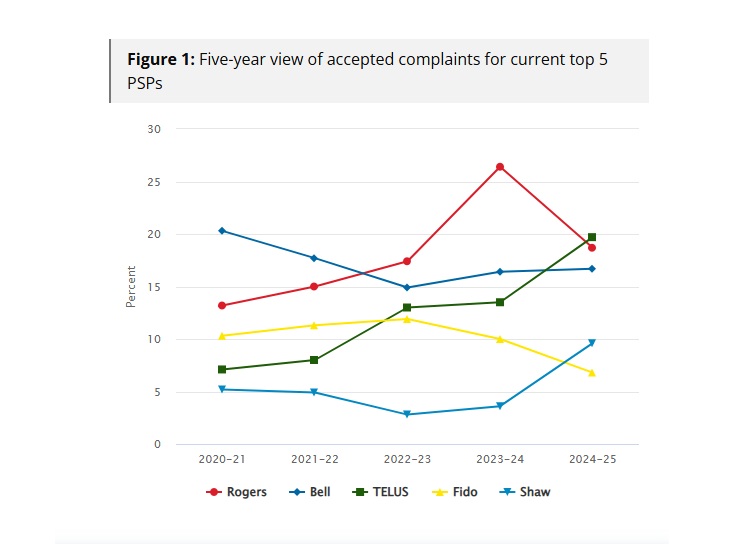
Telus says report “represents a snapshot in time”
For the first time, Vancouver-based telecom Telus has accounted for the highest number of complaints to the Commission for Complaints for Telecom-Television Services (CCTS), with 19.7 per cent of all complaints accepted by the CCTS during the six-month period from Aug. 1, 2024 to Jan. 31, 2025.
That’s according to the CCTS’s Mid-Year Report 2024-25, published early Wednesday morning, which examines complaints received from Canadian phone, TV and internet customers.
Rogers accounted for 18.7 per cent of all complaints accepted by the CCTS during the reporting period, followed by Bell at 16.7 per cent. Shaw Communications, which was acquired by Rogers in April 2023, is one of the five most complained-about providers for the first time in the last five years, accounting for 9.6 per cent of complaints — driven by an increase in complaints about set-top box rental equipment and contract issues, according to the CCTS report. Fido rounded out the top five at 6.8 per cent of complaints.
Telus forwarded an unsolicited statement to Cartt Wednesday morning regarding the CCTS’s findings in its 2024-25 Mid-Year Report, which it said “represents a snapshot in time.”
“The latest CCTS mid-year report shows a 12% increase in industry-wide complaints from August 2024 to January 2025. For 13 years, TELUS maintained the lowest CCTS complaint rate in the national industry. Last year alone, we reported a 90% resolution rate for all customer concerns, CCTS-related or otherwise,” said Terry Wells, Telus senior vice-president of customer service excellence, in the statement.
“We acknowledge our complaint volumes increased during this most recent period, and take full responsibility for these results, viewing every interaction as an opportunity to learn and grow. We’ve taken immediate action based on our customers’ feedback, achieving a 20% reduction in complaints since January 2025, with significant improvements in contract disputes, credit policies, and sales transparency.
“Over the past five years, we’ve delivered substantial price reductions in wireless and home internet services — some exceeding 70% — while investing over $15 billion in network infrastructure. We remain deeply committed to serving Canadians with excellence and transparency,” Wells said.
During the six months covered by the report, the CCTS accepted a total of 11,909 complaints, up 12 per cent compared to last year’s mid-point. Billing issues remain the top concern for customers, with the most common issues including incorrect charges on monthly bills, not receiving promised credits or refunds, and unexpected increases to monthly bills for phone, TV and internet services.
Canadians complained most often about their wireless service, representing 50 per cent of all issues raised during the reporting period. Internet service accounted for 26.3 per cent of all issues. TV issues represented 15.9 per cent of all issues raised, a 49-per-cent year-over-year jump compared to the CCTS’s Mid-Year Report 2023-24.
“Canadians should check their contracts when signing up for services to clearly understand which parts of the price are guaranteed for a set period and which may change without notice,” Howard Maker, CCTS commissioner and CEO, said in a CCTS press release. “Checking billing statements regularly to know what you’re paying is also very important. We see many cases where what a consumer expects to receive doesn’t align with the agreement.
“Telecom and TV service providers should clearly explain promotions and make offers easy to understand for customers to avoid confusion and problems at a later date. If problems do come up, that’s where the CCTS can step in and help. We get results quickly and at no charge for customers,” Maker said.
According to the CCTS’s mid-year report, the telecom and TV ombuds organization helped to resolve 85 per cent of customer complaints during the six-month reporting period, most within 20 days of being received.
Chart borrowed from the CCTS’s website



